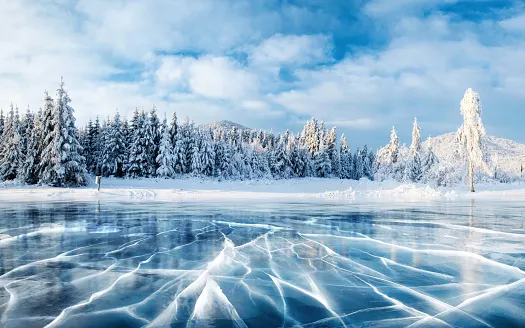
Study suggests loss of lake ice could impact next generation
There’s nothing quite like an afternoon game of shinny on the lake, especially when the weather’s right and you’re stripped down to your sweater, partially wet from sweat, partially from being playfully shoved into the snowbank, and partially from hopping through the knee-deep snow to fetch the puck that missed the net. No matter what age you are, days like these will always bring you back to being a kid. But climate change could threaten fond winter moments like these—and even make them a thing of the past for future generations, according to research published in Nature Climate Change.
Visit our Complete Guide to Spring 2019 for an in depth look at the Spring Forecast, tips to plan for it and much more
“Our study illustrates that an extensive loss of lake ice will occur within the next generation,” the researchers write. To draw this conclusion, the international team assessed the lake-ice records of more than 500 freshwater lakes around the world to develop a model that could be applied to millions of others and predict just how susceptible they are to ice loss. Of the nearly 500 lakes they studied, twenty-eight stood out, including the mighty Lake Superior, which hasn’t frozen three times since the 1850s (in the winters of ’97/98, 2011/2012, and 2015/2016), and was recorded as the second-fastest warming lake in the world in an earlier study. That’s because “deeper lakes have a greater heat capacity and take longer to cool down in the winter,” says Sapna Sharma, a Biology professor at York University and lead author of the study.
VIDEO: THREE TRILLION TONNES OF ICE LOST IN ANTARCTICA IN 25 YEARS
In fact, the research indicates that just a two-degree Celsius increase in air temperature could cause millions of people worldwide to lose access to frozen lakes, and it’s estimated that over 40 percent of the lakes expected to see significant ice loss in the 21st century will be in Canada. This would, of course, affect a lot more than beloved winter pastimes like hockey—it would also have a profound impact on remote communities that rely on ice for transportation, food and supplies, as well as the aquatic species that live in these lakes.
“Loss of lake ice can have consequences for water quantity and water quality,” says Sharma. Lakes that lose ice cover or experience a shorter period of ice cover are warmer in the summer, which can have devastating effects on the ecosystem. “If water temperatures continue to warm, there may be an increased likelihood of algae bloom formation in the summer,” she says. Harmful algae blooms deplete oxygen levels in the water, which can be detrimental for cold water fish, like lake trout, and cool water fish like walleye. According to Sharma, this can also provide more habitat for non-native species like smallmouth bass, which can have devastating consequences on native fish diversity.
But it’s the rapidity at which we may experience this change, and the number of people it could affect—culturally, socio-economically, and ecologically—that really concerns Sharma, and why she and the other researchers involved in the study hope that their results illustrate “the importance of climate mitigation strategies to preserve ecosystem structure and function, as well as local winter cultural heritage.”
This story was written for Cottage Life by Jenna Wootton.





